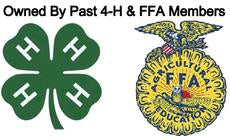The American Forage and Grassland Council (AFGC) is celebrating National Forage Week with the agricultural community June 17-23, 2018. Slightly less than 2 percent of the total U.S. population lives on a farm, making it more difficult for the general public to relate to farming and the accompanying benefits and challenges.
As the general public moves further away from its agrarian heritage and the rural lifestyle, AFGC strives to bring farming and forages into greater public awareness with National Forage Week, now in its fourth year of celebration. Mark Kennedy, AFGC president from Missouri says, “National Forage Week was first celebrated four years ago and was well received by the forage community as one might expect, but more importantly others outside of the forage community were made aware of the importance of forage.
AFGC’s goal is to create an awareness of the many roles that forages play in today’s society. Forages not only provide quality food for livestock, but also provide food, cover, and shelter for wildlife; provide diverse habitat for pollinator species; reduce soil erosion and improve soil health and filter sediments to reduce water pollution. Not only that, forages also provide beauty to the landscape and provide places for recreation. We’ve got a long way to go, but as AFGC and its state affiliate councils get the word out at the local level we’ll make progress."
The National Forage Week campaign is designed to raise awareness and educate the public about the role of forages in dairy and meat consumption. Consumers are increasingly inquisitive and concerned about their food sources, and AFGC is positioning the organization to better understand consumer concerns and inform consumers about the role of forages and forage production.
Gary Bates, director of the Beef and Forage Center at University of Tennessee and chairman of the AFGC National Forage Week committee, says, “We often take forage crops for granted. We look at a beautiful pasture and see the grazing livestock and not the forage. The most impactful plants in our world are right under our feet. Many people do not realize how much forage plants impact their lives. From meat and dairy all the way to ornamental grasses, forages touch most people’s lives in some fashion.”
The National Forage Week promotion includes social media blitzes, photo fliers for local circulation, cameo videos, email blasts and press releases. Any interested groups or individuals wishing to engage in the promotion are encouraged to email AFGC at tina.bowling@afgc.org to receive promotional links, shareable across several electronic formats.
The campaign is expected to grow each year to add additional coverage in farming publications and congressional designation, as forage touches everyone’s lives. Bates says, “Forage crops are some of the most flexible crops in the world. They can be used for their beauty in gardens, as food for livestock, or as tools to save our environment. Without forages, or world would be dramatically different.”
AFGC is asking for support at the local level from forage producers across the nation to help get the word out by putting up fliers in the local farm supply stores, sending press releases to hometown papers, arranging for a public service listings on local business reader boards and posting Facebook, Twitter or other social media posts.
AFGC will be equipping each of their 22 state forage affiliates with promotional materials in addition to the national organization’s campaign. Promotional materials may be acquired by emailing: tina.bowling@afgc.org. Tina Bowling, AFGC Executive Director says, “I encourage everyone to share the National Forage Week video that’s online at the AFGC website (afgc.org) and share your forage experiences at #NationalForageWeek or share a forage photo at #ForageFanaticFoto because forage isn’t just about food and fiber but water quality and soil conservation too.”
To learn more about participation in National Forage Week visit afgc.org.





